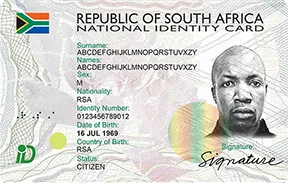Apply for an Identity Document
If you are 16 years and older, you may apply for an identity document (ID). You will need an ID to register for your matric exams, get a driving licence or open a bank account. Applying for a South African Identity Document (ID), specifically the Smart ID Card, involves a combined online and in-person process through the Department of Home Affairs (DHA).

Applying for a Smart ID Card
First-time applicant: (if in possession of an ID book, your application is a re-issue). Here is a step-by-step guide based on your current status (First-Time Applicant vs. Replacement or /Reissue).
First-time Applicant
- Must be accompanied by their parent/s where parents are alive. It can be one parent in person.
- Where parents are deceased, an informant or legal guardian should accompany the applicant.
Required Documents
- A certified copy of a birth certificate
- A certified copy of the parents, informant or legal guardian’s ID
- Certified copies of a death certificate (in cases where a parent is deceased)
- A certified ID copy of the deceased parent
Fee
- No payment is required
Re-issue of a Smart ID Card
- If replacing the Green Barcoded ID book with a Smart ID card, a copy of the green bar-coded identity document/affidavit is required in case the identity document is lost
- If replacing a Smart ID card, a copy of the old/lost/damaged card or an affidavit is required
- A marriage certificate is required in case you have changed status
- A divorce decree, if divorced
Fee
- The fee for the re-issue is R140.00
Temporary Identity Certificate (TIC)
- If your application for an identity document will not be completed in time for you to vote, you can apply for a Temporary Identity Certificate (TIC). A TIC is valid for two months and is subject to positive verification of your fingerprints.
Required Documents
- ID number for verification
- 2 ID photos
FEE
- The TIC will cost R70.00.
How to APPLY Application
Option 1: The Online Application (eHomeAffairs)
The fastest and most convenient method is to start the process online via the eHomeAffairs portal. This allows you to complete the forms, upload documents, and pay the fee before your in-person appointment, saving you significant time at the office.
Online Steps:
- Register: Go to the official eHomeAffairs Portal and create a profile.
- Apply: Log in and select the option to apply for a Smart ID Card. You will complete the application form and capture your personal details electronically.
- Upload Documents: Scan and upload the required supporting documents (see list above).
- Pay: Make the required payment online via your internet banking portal (e.g., FNB, Standard Bank, Nedbank, etc.).
- Book Appointment: Schedule a mandatory appointment at a DHA-enabled bank branch or a participating Home Affairs office that uses the “live capture” system.
Check out full information about How to use eHomeAffairs
In-Person Steps (Biometrics):
- Attend Appointment: Go to your chosen branch or /office on the scheduled date.
- Verify & Capture: A DHA official will verify your original documents and capture your digital photo, fingerprints, and signature (biometrics). You do not need to bring ID photos, as they are taken on site.
- Collect: You will be notified via SMS when your Smart ID Card is ready for collection at the same branch or /office.
Option 2: The In-Person Application
You can also apply in person directly at any Home Affairs office that processes Smart ID Cards. No appointment is generally needed for the main offices, but waiting times can be long.
- You will fill out the necessary DHA-9 form and undergo the entire verification and capture process at the office.
General Information
If you get your ID and there are errors in the personal information, the Department of Home Affairs will replace your ID free of charge.
You can apply to have your ID re-issued if:
- You are married and want to assume the surname of your spouse.
- You are a woman and want to apply for a new ID using any of your previous surnames.
- Your ID book has been lost, stolen or damaged.
The Department of Home Affairs is replacing the green ID book with a smart ID card over eight years starting in 2014. You will not necessarily get an ID card when you apply now. If you already have an ID, you will be invited to apply for the ID card.
Find out more about getting an identity document or contact the Department of Home Affairs.
Applying for an ID Book (Where offices do not offer Smart ID Cards)
First-time Applicant
Applicants must submit the following documents to their nearest Department of Home Affairs office or South African mission or consulate abroad:
- A certified copy of your birth certificate or reference book
- Two identical colour photographs
- A full set of fingerprints in an applicable form
Naturalised Citizens and Permanent Resident Permit (PR) Holders
You must provide the following:
- Your original naturalisation certificate and a copy thereof (certified by Home Affairs)
- Your original permanent residency certificate and a copy thereof (certified by Home Affairs)
- Your original exemption certificate and a copy (certified by Home Affairs)
- If any certificate cannot be furnished, apply for a re-print/copy before submitting the ID book application
Re-issue of an ID Book
- Provide an affidavit where you have lost or damaged your Green Barcoded ID book
- If married and wanting to assume spouse’s surname, submit a certified copy of your marriage certificate
The required fee is R140.00
Applying Abroad
People living abroad can apply for ID books at South African missions or consulates. All applications are sent to the Department’s Head Office in Pretoria for processing. Delivery will take longer than a local application due to logistics.
